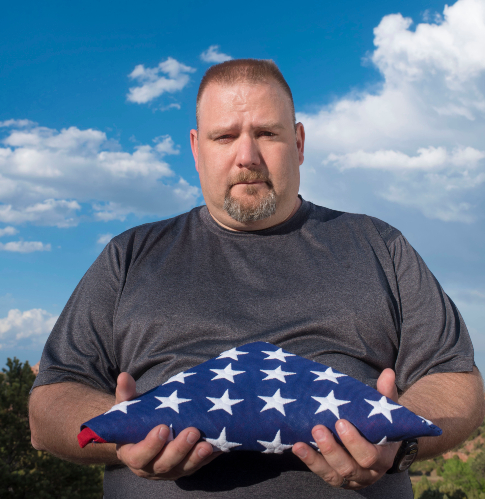Veterans Help One Another Manage PTSD and Stress During Pandemic

Air Force veteran Tim McDonough remembers exactly how many HRs — human remains — he brought back from Iraq while on active duty: 214.
He felt honored to bring fallen soldiers home. But eventually, he began feeling isolated and suspicious of befriending others, fearing they might be next “downstairs” in the cargo hold of the plane. His thinking shifted to guilt, and a dark cloud of paranoia settled over him.
But even after episodes where he would just walk for miles — and sometimes days — in the woods near his home in upstate New York (prompting a police search one time), he had a hard time believing he had PTSD.
Then he found Wounded Warrior Project® (WWP) and began to see that it’s “not just the frontlines guys” who develop PTSD.
“I was in huge denial,” Tim said. “I was thinking ‘I can’t have this. This can’t be me.’”
Through WWP connection events, he realized other veterans are experiencing the same thing. At a mental health workshop, Tim learned tools to bring himself back to his day-to-day life and his loved ones. He reconnected with his love of cooking and worked through the pain of a shoulder injury to become an archery champion and instructor.
More recently, he wanted to stay connected to other warriors during social distancing brought on by the COVID-19 pandemic. He found a way to do that, and help his caregiver connect with others, thanks to a virtual support group that grew out of a WWP-hosted Coping with COVID-19 class.
A small group of veterans, including Tim, participated in the five-week mental health awareness class with warriors from across the Northeast. They decided to continue meeting virtually to support one another through these uncertain times, connecting via Zoom teleconference every Tuesday at noon.
The virtual meetings give warriors a close-knit group to lean on while managing stress, PTSD, and other challenges. “By having a weekly meeting, it holds us accountable to each other to stay in touch, stay positive, and continue helping each other,” Tim said.
People Who Understand What You’re Going Through
The meetings may seem informal, but the intent is rooted in behavioral science and first-hand experience with PTSD.
Two WWP teammates, who are also veterans, created the five-week class. With first-hand knowledge of the challenges of navigating life with PTSD, they came together to create something that would address everyday triggers for anxiety, depression, and PTSD triggers.
The teammates enlisted the help of a mental health professional and suicide researcher who is also a veteran. The initial five-week course integrated tools to manage uncertainly, fear, and anxiety — and how to have conversations that relieve PTSD symptoms.
While not intended as a therapy session, the course filled a gap as social distancing became the norm. It allowed participants to maintain a strong connection, and it naturally gave way to the virtual meetings now ongoing on Tuesdays throughout the summer.
“Managing PTSD is something you do day to day, one day at a time,” Tim said. “You look the enemy in the mirror and tell it, ‘Not today — today you don’t get to control my life.’ As we acquire more tools and a better support system, the ‘not today’ becomes ‘not this week, not this month, and maybe at some point not this year.’
“There might always be a trigger waiting to push you to that end. It’s how we react to those triggers that makes us who we are today.”
During the course of the meetings, Tim and his caregiver became homeowners, and the group offered extra support through their transition. In addition, the virtual meetings filled a gap while his culinary classes were on hold during the pandemic.
Tim wishes to give back to other veterans by being a peer support team leader in his New York area. “I would love to be part of more warriors who stand up and give back to the organization that’s given so much to us,” Tim said.
For now, he cherishes the time he’s able to spend connecting — whether virtually or in-person — with other veterans.
“It’s amazing how much better you can feel and how fast you can push through things when you are with people who want to understand what you’re going through, and who are a support system and a sounding board to reinforce what you have conquered together.”
In the first two months since virtual programming launched, more than 6,000 warriors and family members participated in 525 virtual connection events and 151 warrior-led virtual support group meetings. Of the warriors who participated, 92% say WWP virtual programs and events have helped relieve stress brought on by the coronavirus pandemic.
Learn more about how WWP helps warriors manage PTSD.
About Wounded Warrior Project
Since 2003, Wounded Warrior Project® (WWP) has been meeting the growing needs of warriors, their families, and caregivers — helping them achieve their highest ambition. Learn more.